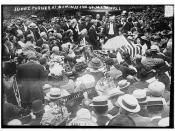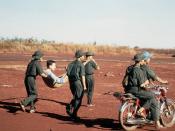Killers or Heroes?
Most soldiers are unknowingly conscientious objectors. They try to avoid taking a human life. This is not a bad thing. Rather, it is a reflection of a strong moral upbringing. Getting most soldiers to pull the trigger on another human being requires great effort. In World War II, General S.L.A. Marshall studied infantry unit firing ratios and concluded that only 15 to 25 percent of infantrymen ever fired their weapons in combat. In general, those on specialty and crew-served weapons were firers, while the nonfirers were almost exclusively riflemen. In On Killing, David Grossman points out that there are three things that make soldiers kill: conditioning, recent experience and temperament.
Soldiers can be conditioned individually and collectively to pull the trigger. Individual conditioning includes gunnery and rifle ranges where pop-up human shaped targets are rapidly engaged without thought. The trigger-pull response becomes automatic. Close supervision also affects firing rates.
Men pull the trigger more frequently under supervision or in groups, hence a higher ratio of firing among key weapons. Artillery, the greatest killer on the battlefield, has always killed in teams. We indirectly condition soldiers to kill by training them as killing teams. Recognizing that men had to be conditioned to fire, the Army changed its training programs after World War II, and firing rates during the Korean War rose to 55 percent. This figure reached 95 percent during the Vietnam War. Soldiers can be taught to pull the trigger, but that does not guarantee that the bullet will find the target.
Recent experiences, such as the death of a comrade, can cause soldiers to kill the enemy out of revenge or frustration. This is a temporary condition resulting from combat stress. It is based upon emotion and can subside as quickly as it occurred.



Very informative and also very true!
I have served in the army and my grandfather also has. He served in WW2 and we have talked many times on this exact subject. You have really written this exactly the way we have talked about it. So much has changed over the years for the training in the United States Army. Thanks for giving this subject its due.
11 out of 11 people found this comment useful.